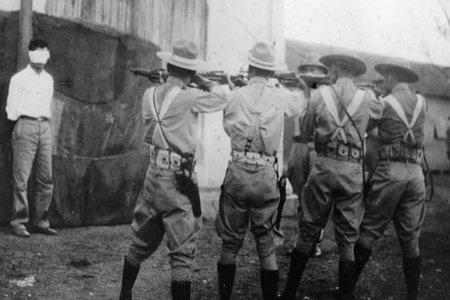Will the Scarcity of Lethal Injection Drugs Lead to More Executions by Firing Squads?
Published: Apr 01, 2015

Controversy surrounding the death penalty has intensified following Utah’s recent enactment of legislation that would allow convicted capital offenders to be executed by firing squad if lethal injection drugs are unavailable. The bill’s sponsor, Republican Paul Ray, claimed that a firing squad was “probably the most humane way to kill somebody." When signing the bill into law, Republican Governor Gary Herbert stated that finding an alternate method of execution was necessary because of the dearth of lethal injection drugs. Utah joins Tennessee, which authorized the use of the electric chair last year, in returning to formerly obsolete forms of execution.
The three drugs used to execute inmates became scarce after both American and European companies chose to stop supplying the drugs to death penalty states. States with scheduled executions then turned to compounding pharmacies to fill custom orders for the lethal cocktail. However, following the botched execution of Clayton Lockett in Ohio last year and pressure on pharmacies by anti-death penalty advocacy groups, compounding pharmacies have become wary of distributing the drugs.
Texas reportedly scrambled to find a supply of lethal injection drugs before finding an unnamed compounding pharmacy to fill the order. In Georgia, an execution was postponed after authorities become skeptical of the appearance of compounded lethal injection drugs. Ohio has completely run out of the drugs and has delayed all executions until 2016 in order to locate the necessary doses. Oklahoma is now considering the use of nitrogen gas as a method of execution.
It is unlikely the lethal injection drugs will be any easier for death penalty states to procure in the future. Earlier this week, the American Pharmacists Association adopted a policy formally discouraging its 62,000 members from providing lethal injection drugs. The new policy states that participating in executions is "fundamentally contrary to the role of pharmacists as providers of health care." Although the Association’s policies are not legally binding, they provide ethical guidance to practicing pharmacists, pharmaceutical scientists, student pharmacists and pharmacy technicians.
While the American Pharmacists Association’s new policy certainly is honorable, it may have the unintended consequence of leading death penalty states to adopt more barbaric, and potentially less humane, forms of execution as demonstrated by Utah’s enactment of execution by firing squad. Rather than taking a moment to reflect on whether killing a human being for his or her crimes is the most cost-effective method of punishment or the best way to deter future crimes, death penalty states appear to be fervently clinging to capital punishment and dusting off their old forms of execution or creating new ones, no doubt compounding the cost that executions already have on the taxpayer. It seems that as the result of rising public opinion against the death penalty and the scarcity of lethal injection drugs, now may be the perfect time for lawmakers to consider the efficacy of capital punishment and whether their constituents might be better served by abandoning the practice entirely.
Follow Vault on Twitter @VaultCareers, @VaultFinance, @VAULTLAW, Instagram @VaultCareers and Facebook!
Read More:
The Return of the Electric Chair, Firing Squad and Gas ChamberSaving Clients from the Death Penalty
Profile: The death penalty - in Utah and across the world (The National)
Death penalty complication: Pharmacists group discourages providing execution drugs (LA Times)
Pharmacists group votes to discourage members from providing execution drugs (NPR)
Utah lawmaker proposes bringing back firing squads for executions (Fox News)
